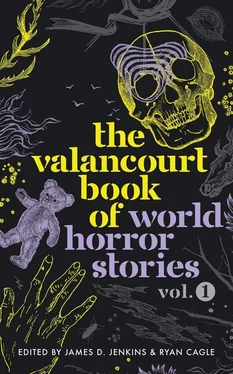‘Manel, come here! You have to take a photo of me. This will be the final one!’
A photo? Òscar is still thinking about photos? About the abysm.
The abysm.
Abysms.
The marriage certificate. Is he divorced? That will make things complicated.
Òscar, gripping the cub with his right arm, pulls out the camera with his left hand and without moving extends it behind him to Manel, who is already approaching.
‘Here, stand in front of me, Manel. You have to see this. You’ll be the one to shoot the last photograph in the series. The perfect photograph, Manel. And it will be you. You’ll be the one to shoot it.’
Manel takes two more steps, grabs the camera. He stops. Òscar turns his head again and kisses the cub’s head.
‘Stand in front of me, Manel. You have to see this. The perfect photograph. Now I understand, Manel.’
Manel contemplates Òscar’s back, his wide shoulders, his head lowered, probably looking at the photos he took, as usual.
He looks at the shotgun in his left hand.
He looks at the camera in his right hand.
He again contemplates Òscar’s back. His bowed head. His curly blond hair.
And he shoots.
Translated from the Catalan by Mara Faye Lethem
Bathie Ngoye Thiam
THE HOUSE OF LEUK DAWOUR
Located on the west coast of Africa, Senegal has a long tradition of storytelling; many of these stories involve the rab ( evil spirits ) , djinn ( powerful supernatural creatures ) , and deum ( considered capable of draining a person’s life force ) . While frightening stories involving these beings are well known to most Senegalese, they have historically existed primarily in oral, rather than written, form. Bathie Ngoye Thiam , in his Nouvelles fantastiques sénégalaises (2005) , adapted many of these oral traditions into modern-day fantastic or horror tales, including the following story, which deals in part with a rab called Leuk Dawour . The author informed the editors that even today many in Senegal’s capital city of Dakar refrain from mentioning Leuk Dawour’s name for fear of attracting his attention. Indeed, when he was in the process of publishing his collection of tales, the author’s mother told him he should write stories about love or societal problems instead and warned him to leave the djinns and rabs alone. Fortunately for us he didn’t heed her advice!
Is there anyone from Senegal, especially from Dakar, who has never heard of Leuk Dawour Mbaye?
Leuk Dawour is the rab of Dakar, just as Ndoumbé Diop is Diourbel’s rab , Mame Coumba Lamba is Rufisque’s, and Mbossé is Kaolack’s . . .
It is well known that a town doesn’t belong to the humans who are busy there in the daytime, but to a rab (spirit) who prowls it at night. Woe to anyone who finds himself in its path. They say that Ndoumbé Diop appears in the form of a hen accompanied by her chicks. Seeing that hen after midnight means instant death or incurable madness. Mbossé, on the other hand, takes the form of a monitor lizard. There is one they say waits until you are in the middle of a street; he then transforms into two thundering barrels which shoot out from opposite ends of the roadway, roll at great speed, and come to crush you. Ask our ancestors, they will tell you many such stories. Those who happen to remain on the streets until undue hours risk unpleasant encounters. They are found the next day, dried out and inert like chunks of wood or, in the best case scenario, with their mouth in the back of their head. Naturally I couldn’t swallow such nonsense. Yet . . .
Let me catch my breath before continuing . . .
It all started the night before the ‘disappearance’ of Bakary, my husband. My mother uses that word, disappearance . As for the others, they never stop telling me he’s dead, which I can’t bring myself to believe. Bakary couldn’t leave me like that . . . Without even saying goodbye . . . There are also rumors that I killed him . . . What twisted minds! How could anyone imagine that? . . . No, I’m not whining. There’s no reason to. I’m not worried either, I know he will return. He’s just gone to visit his family in Mbour. His car probably broke down . . .
We met, I’ll always remember it, at a Senegalese party on the university campus, in Paris. We had an instant connection. Love at first sight, as they say. Since then we’ve never been apart. We got married in France, since my father couldn’t accept someone from another caste, and especially from a low social class, as a son-in-law. Me, I had found the man of my life and I wasn’t going to let him go for anything in the world.
Bakary was a musician, a talented percussionist. In fact, he played a little of everything. Gifted at everything, he often composed pretty ballads just for me. However, what I liked best about him – besides the love and respect he showed towards me – was his great sensitivity, which was both his weakness and his strength. He was true to himself in all circumstances. Just like me, he rejected almost all social conventions and led his life as seemed best to him. But, unlike me, he came (as I said earlier) from a very modest background, from poor parents in other words.
As for me, as you might suspect, I am, you might say, from high up in Senegal. I’m not boasting of it, but I’m not ashamed either. You have to be born somewhere, right? My mother is well known in the business world, and my father has important responsibilities in the administration. I’m the youngest of four siblings. The only daughter in the family. Let the indigent take comfort in listening to my story! Princesses often envy Cinderellas. I was raised in luxury, but I felt like I was in prison.
I was brought up with good manners, for in that society the image you project is the most important thing. I was stuffed full of good manners, stuffed to the point of vomiting. Ugh! Good manners! ‘Dress like this . . . Walk like that . . . Talk this way . . . Don’t look over there . . . What are you doing at such an hour? . . . Who is that boy who called? . . . You’re not going out this week . . . You have to have a chaperone . . . Watch out for thugs . . . There’s an invitation . . . There’s a reception . . .’ Whoa! Whoa! That way of life disgusted me. Yet I had to play the game, pretend . . . It was the only way to gain my parents’ confidence and convince them to send me to pursue my studies in Paris.
I even forced myself to smile and be friendly with Matar, the minister’s son to whom they’d introduced me and whom they invited over at the slightest occasion.
‘How charming that boy is!’ Mother would exclaim.
‘He’s got a good head on his shoulders! The country needs young people like him,’ Father would one-up her.
The hell with the country! The hell with Matar’s head! (The poor guy! He didn’t understand a thing. Whenever my parents left me alone with him, wanting to encourage a certain intimacy, I would tell him to get lost.)
At last I was in Paris! Mother, who had made the journey with me, had stayed in my apartment almost two months just to make sure everything was going well. She cooked my meals, did my laundry, and made my bed. It’s true that at the time I wasn’t even capable of making coffee or cooking an egg. Everything was done for me. Rich people don’t leave their children without safeguards. I was kept away from fire and all danger. Even when I went to the preschool directly across from our house, someone always had to bring me across the road. What can I say? You can’t choose your parents. Mother, who intercepted my mail, gave me the letters that Matar would send me almost every day. Some very clumsy declarations of love, only good for filling trash bags with. All the same, I continued playing the game until my progenitor’s departure, which let me breathe such a sigh of relief!
Читать дальше











